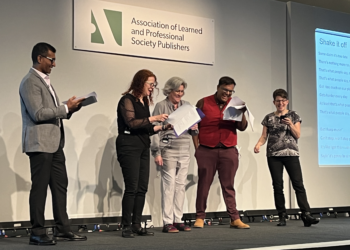Editor’s Note: August’s Mental Health Monday is a two-part series of community posts where members of the Society for Scholarly Publishing (SSP) Mental Health Taskforce (Charlene Chuquillanqui, Ryan Reeh, Dianndra Roberts and Adrian Stanley) asked Editors within the mental health and psychiatry sector their thoughts on the current landscape of scholarly publishing and how it is impacting our discussions and actions around mental health. Part One is below and Part Two will be available Tuesday.
Can you tell the readers a little about your professional background and how you became editor of the journal/committee/editorial board?
Anne Doherty (University College Dublin, Royal College of Psychiatrists Books Editor): After finishing medical school and completing the intern program, I trained in psychiatry and specialized in Consultation Liaison Psychiatry. This specialty is concerned with the mental healthcare of people who also have physical illnesses or who are in a physical healthcare space (such as people attending the emergency department with a crisis such as self-harm). When I finished my specialist training in psychiatry in Ireland, I moved to a post in South London to work in a specialist diabetes & mental health service and was keen to reconnect with the world of writing.
So, when a vacancy arose in the Royal College of Psychiatrists (RCPsych) to lead on the development of the (then in-house) books program as Editor, I was very excited at the idea of being involved in academic publishing. In the past nine years, the role has evolved considerably. We formed the Books Committee to ensure the publishing and medical expertise to guide the development of the Program, and the RCPsych, who previously published in-house, formed a partnership with Cambridge University Press. I returned to Ireland and have been able to continue in this role from Dublin.
Gin Malhi (University of Sydney, British Journal of Psychiatrists Editor-in-Chief): I trained as a medical doctor, gaining my primary qualifications from the University of Manchester and eventually chose to pursue a career in psychiatry. My clinical experience and scholarship in psychiatry began in earnest in Cambridge where I trained for 4 years prior to embarking upon a career in research and focused increasingly on mood disorders. By the time I completed my specialist training I had published several books and moved to Australia. There I took up a series of academic positions, completed my doctorate, and became further interested in the publishing environment, in time becoming Editor-in-Chief of Acta Neuropsychiatrica in 2006. I found being editor exhilarating, eventually becoming the Editor-in-Chief of the Australian and New Zealand Journal of Psychiatry. Currently I am College Editor and Editor-in-Chief of The British Journal of Psychiatry. I have thus been an Editor-in-Chief for 18 years and have more than a quarter of a century of experience in publishing.
Adam M. Brenner (Academic Psychiatry Editor-in-Chief): As an early career psychiatrist it became clear that I had a passion for psychiatric education; discovering the journal Academic Psychiatry was pivotal. Here was the scholarly community that I wanted to be part of! My first submission to the journal was rejected, but the review process felt supportive, generative, and encouraging of persistence. I soon became a reviewer myself, which seemed both a great privilege, and a wonderful way to learn more about psychiatry education scholarship. When the journal put out a call for applications for associate editors, I had no hesitation about applying and was truly thrilled when selected. Serving now as Editor in Chief is an opportunity to provide stewardship to an institution that has been my scholarly home for several decades.
Karli Montague-Cardoso (PLOS Mental Health Executive Editor): I entered the publishing world relatively late after about 15 years in academic research. I initially obtained my PhD from University College London, focusing on the development of therapeutic targets for Motor Neuron Disease before moving to King’s College in London where I undertook two very different postdoctoral projects — one aimed at understanding the mechanism underlying the development of the cranial nerves and one focusing on neuroimmune interactions in the context of chronic pain. So as you can see, quite a heavy cellular & molecular neuroscience focus. During the pandemic, like many, and for various reasons, I changed career paths and entered publishing — initially at Springer Nature where I was the Deputy Editor for Communications Biology and Consulting Editor for Communications Medicine. I also spent some time at Nature Neuroscience. Here is where I was really able to start bringing my mental health lived experiences into the workplace. I chaired the UK staff Well-being network, co-chaired the staff Disability and Neurodiversity network, was heavily involved with the company’s Sustainable Development Goal 3 mental health research focus group and was trained in Mental Health First Aid. I am now also about to start training as a Psychotherapist. After so many years in research, I ended up realizing that not only did I really enjoy working publishing, but I also really enjoyed merging that with my personal interests in mental health. So, when PLOS Mental Health came along, it really was a perfect opportunity for me and a tangible chance to help change the mental health landscape.
Taiane de Azevedo Cardoso (Scientific Editor, JMIR Mental Health): I am a clinical psychologist with a Master’s and PhD in Health and Behavior. My research focuses on understanding the clinical trajectories of individuals suffering from bipolar disorder. I have always been passionate about empowering people with evidence-based knowledge. My clinical practice was based on cognitive behavioral therapy, which has the ultimate goal of teaching patients to become their own therapists. My main motivator to join JMIR Publications’ team as a Scientific Editor was the opportunity to make significant contributions to the scientific community and empower people with high-quality evidence-based findings. This aligns with JMIR Publications’ vision: “We envision a world where people are empowered by health research and technology to make effective, informed decisions, take control of their health and well-being, and live happier and healthier lives.”
Shruti Kochhar (Managing Editor JMIR Mental Health): I have a bachelor’s degree in Pharmaceutical Sciences from the University of Delhi, and a Master’s degree in Pharmacology from the University of Oxford. I joined JMIR Publications as a Managing Editor after working as a Graduate Research Assistant in Neuroscience at the University of British Columbia. Throughout my academic career, I always valued the importance of free and easily accessible evidence-based research. The global pandemic further highlighted the critical need for public access to reliable information, enabling people to make informed decisions about their health. This insight led me to venture into open-access publishing, with a mission to advocate for the worldwide dissemination of knowledge and information.
John Torous (Harvard Medical School, Editor-in-Chief JMIR Mental Health): I am a dually board-certified psychiatrist and clinical informaticist who is currently an Assistant Professor at Harvard Medical School. I joined JMIR Mental Health as a reviewer, then became an Associate Editor, and seven years ago, the Editor-in-Chief. Even when I first began working with patients over a decade ago, I saw that people were interested in using technology to augment their care. But there were so many unknown aspects about what to use and what could even work. So, my interest in the field began with seeking answers to how to best use digital innovations to help patients, and that quickly led me to JMIR Mental Health. It continues to drive my goals for the journal to this day.

Please tell us a little about the scope of the journal/committee/editorial board, the type of research you aim to publish, and vision and positioning of the journal/committee/editorial board
Anne Doherty: The RCPsych Books Program publishes a range of books in association with Cambridge University Press for doctors (and other professionals) working in psychiatry. The Program is guided by the Books Committee which has a membership including publishing experts within the RCPsych, RCPsych members across a range of specialties and career stages and publishers and publicists from Cambridge University Press.
Rather than focusing on textbooks, we aim to publish books that help doctors on the frontline in delivering mental healthcare to patients. The books published are generally of interest to doctors at different stages of training in psychiatry and aim to support both training and professional development. We try to ensure the books are clinically focused and relevant. At the same time there is a high standard of academic rigor, with books undergoing peer review at proposal, stage and again when the final manuscript is produced.
Gin Malhi: The British Journal of Psychiatry (BJPsych) is the oldest journal within the BJPsych portfolio. It is about the mind – and the psychiatric problems that can arise when there are problems in the brain and in our lives. The journal attempts to curate the best in psychiatric research and at the same time provide novel insights into topical issues pertaining to clinical practice. It has different article types to engage readers ranging from editorials to commentaries and letters that capture the questions that psychiatry poses to research and review articles that identify and synthesize the evidence.
The research that the journal features is what genuinely makes an impact – it moves the needle and has meaning. My vision for the journal along with the portfolio as whole is to become an authoritative source of mental science for clinical practice not only in the UK but worldwide. This is not a solo effort, far from it, and in fact it requires the collective might of like-minded individuals. To this end I am supported by an excellent team and an equally impressive editorial board – the members of which share my aspirations for the journal.
Adam M. Brenner: Academic Psychiatry’s core focus is education of medical students and residents in psychiatry. For medical students, what does every future physician need to learn about mental illness? For residents, how do we most effectively train psychiatrists to embrace the complexity of mental illness and meet public mental health needs? The journal scope includes all aspects of the work of academic psychiatrists and departments that are vital to education – faculty development, workforce pipeline programs, trainee and faculty wellbeing, ethics in psychiatry training, leadership and administration of academic psychiatry departments, etc.
Karli Montague-Cardoso: PLOS Mental Health is interested in all areas related to mental health and well-being- from research, to treatments, to policies. However, there are some very clear priorities that we have at present that are very important to myself and our co-Editors-in-Chief, Rochelle Burgess and Charlene Sunkel. A common thread that runs through all of our efforts is elevating the voices of lived experience. This is something that is long overdue and essential for shaping the mental health field moving forward.
By ensuring that we listen to and understand different experiences, we can better equip ourselves to identify both the vast and more nuanced differences between individuals and communities. This will put us in a better position to challenge and reject the structural barriers that prevent too many people from accessing the mental health care that they need. I think this mission is explained well in our launch editorial. We have a dedicatedlived experience section in our journal and encourage lived experience perspectives to be brought in across our sections. In addition to this focus, we are also keen to support cross-disciplinary collaborations and communication. Getting everyone around the same table, from researchers, to practitioners, to policy makers, to those with lived experience is the best way to facilitate the implementation of much-needed changes.
JMIR Mental Health Team: JMIR Mental Health has a unique focus on digital health and Internet/mobile interventions, technologies, and electronic innovations for mental health, addictions, online counseling, and behavior change. In an editorial published last year, we outlined our strategic priorities, emphasizing the need for papers to highlight the clinical relevance of their findings.
Through these priorities, JMIR Mental Health aims to drive forward the field of digital health, ensuring that innovations are both accessible and impactful: addressing digital literacy and skills barriers, and reducing equity issues to access digital health interventions; focusing on diverse communities and providing care to underserved populations and including patients’ perspectives; discussing privacy concerns; making sure that the studies are replicable; assessing efficacy, and improving engagement.
To improve access to information, JMIR Mental Health in collaboration with the Society of Digital Psychiatry hosts free monthly webinars to highlight important developments in the field of digital mental health. Our goal is to foster an inclusive and dynamic community where ideas can be exchanged freely. We want our audiences to not only gain knowledge about new technologies and innovations, but also learn to use said innovations to improve their own mental wellbeing or to support others around them. Most of our themes focus on everyday challenges encountered by families or individuals. For more information, you can visithttps://mental.jmir.org/announcements/494.
With our interview subjects introduced, tomorrow’s Part Two will turn toward discussion of the changes in the field and thoughts on mental health publishing.


